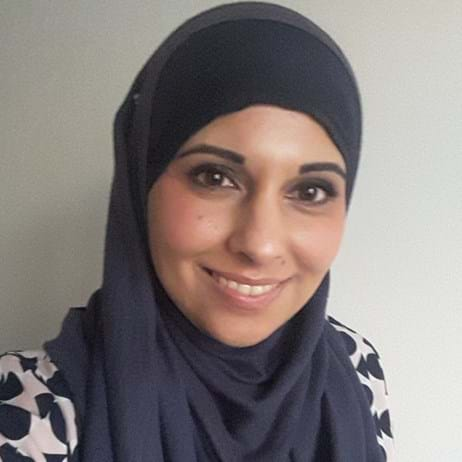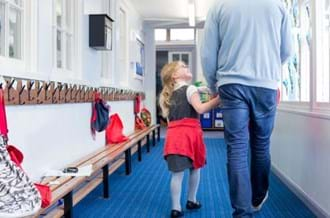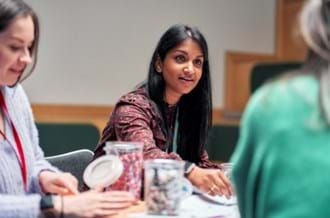How the 'Race is Complicated' toolkit for anti-oppressive practice came to be and its future impact
How the 'Race is Complicated' toolkit for anti-oppressive practice came to be and its future impact

Myira Khan
Myira is an Accredited Counsellor, Supervisor, Coach, and Counselling Tutor, and the Founder of the Muslim Counsellor and Psychotherapist Network (MCAPN), and author of Working Within Diversity – A Reflective Guide to Anti-oppressive Practice in Counselling and Therapy. She regularly delivers trainings and events internationally on Working Within Diversity and anti-oppressive practice.
Place2Be, alongside the Coalition for Anti-Oppressive Practice, recently launched the Race is Complicated Toolkit. Myira Khan played a key role in the toolkit’s creation and was a speaker at the launch event in October. She shares her thoughts on the creation, impact and sustainability of the toolkit.
How and why did you get involved with the Race is Complicated toolkit?
I represent the Muslim Counsellor and Psychotherapist Network (MCAPN), which was invited to be a coalition member. I am also a counsellor, supervisor, and trainer myself (specialising in training in diversity issues), so I represent marginalized identities within the profession. My experience allowed me to shape this much-needed change from a strategic perspective, as well as a practitioner and trainer perspective. This helped ensure the toolkit (which is aimed at training providers) is fit for purpose essentially.
How do you think the toolkit will impact the therapy and counselling professions?
At a time when we are hearing so much within the profession about this pivot into inclusion and anti-oppressive practice, this toolkit invites people to think about these difficult concepts. But it does this in a way that supports you and gives you a guiding hand. It doesn't shame, and it doesn't assume or expect that you come with any knowledge.
It’s a really solid starting point to develop as a tutor, or to support a training institution, to embrace anti-oppressive practice.
Having one specific resource that directly addresses the training of race, ethnicity and diversity is invaluable, especially as it's free and easily accessible across the profession. It means it can be anchored within the sector.
Trainers now have a go-to resource where they can get immediate support and practical advice. The toolkit gathers lots of different elements into one resource that you can then just download as the PDF and you’re good to go.
The toolkit came to be through a collaborative process, born out of a coalition agreement. Why was this so important?
The coalition’s investment in the toolkit is vital to its success; each organisation is committed to implementing the toolkit within their own remit, whether that's a professional body that accredits courses, or an organisation that supports tutors.
How do you think we can ensure that the toolkit is sustainable?
For me, it’s about how do we connect the dots between what we're asking people to do with the toolkit and how that then shows up in practice. Are we getting it reflected in accrediting courses and curriculums? Is it being reflected in qualification, eligibility or criteria to be joining those professional bodies? I would love for professional bodies to ask those who want to join, if their training has covered anti-oppressive practices.
What do you envisage for the toolkit’s future?
When we created the toolkit we envisaged it as a living, breathing resource that evolves with culture and represents its time. So, people can refer to the toolkit at any time, now or in the future, and it will provide up-to-date, relevant and time-sensitive content and language.
I think of the toolkit like a drop in the ocean that I hope will spread throughout the layer of training, and then will filter down and spread into the level of actual therapeutic practice.
Ultimately, the impact on the client will be that they are on the receiving end of a therapeutic experience. This takes into account that their lived experience takes place within this external context of structural and systemic inequality. And for clients then to ultimately feel safe, that their lived experience holds truth, and that their truth is respected and held in equality alongside the practitioner’s.
How applicable do you think the toolkit is to be used internationally?
It’s absolutely applicable because anti-oppressive practice applies to all cultures, all countries, all societies - no society offers equality to all of its citizens.
Anti-oppressive practice within therapy and counselling, is about offering equal relationships within the therapy space, that we can also take outside the therapy room. It gets us, as societies and as cultures, to challenge the status quo of systemic oppression and inequality.
What's brilliant about the coalition is that the reach of the organisations is international. And so through events, through trainings and through our global partners in the field, there is nothing to stop us from being able to launch it worldwide.
News & blogs

Uniting health and schools to improve mental health
Read Place2Be Chief Executive, Catherine Roche's, thoughts on uniting health and schools to improve mental health.
Read more
Fostering the power of relationships
Celebrate the power of relationships to transform the lives of children and young people in foster care.
Read more
Hayley and Jaynie's experiences on Place2Be’s Level 5 Certificate course
Read Hayley and Jaynie's experiences on our Level 5 course and their engagement with our unique therapeutic approach.
Read more



